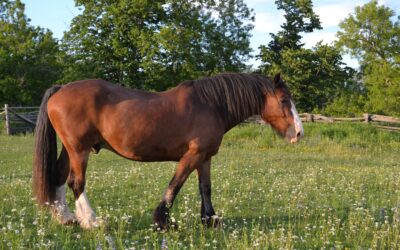Autistic children and youth are one of the client groups we support. The Mane Intent’s founder, Jennifer Garland, RP, has just completed a six-week course called Paddock Play to ensure we are best supporting autistic clients with a neuro-affirming mindset and approach to our practice.
Neurodivergent people experience the world in their own unique way. For example, communication styles and needs are distinct to each individual. Initiating and transitioning between tasks can be challenging. When these are too many competing demands, emotion regulation is challenged. An individual’s awareness of internal body sensations and cues may also be compromised. Neurodivergent people often have difficulty with sensory modulation. This means they may struggle with over-responding to sensory input, under-responding to sensory input or engaging in sensory-seeking behaviour.
Equine-assisted learning (EAL) can be particularly beneficial for young people with autism due to several reasons:
- Non-verbal Communication: Many children with autism struggle with verbal communication but often excel in non-verbal communication. Horses are highly attuned to non-verbal cues, such as body language and facial expressions. Interacting with horses can help children with autism learn to interpret and respond to non-verbal communication, which can translate into improved social interactions with others.
- Sensory Stimulation: Children with autism often have sensory sensitivities or seek sensory stimulation. Horses provide a unique sensory experience through touch, grooming, and being around their size and presence. This sensory interaction can help in sensory integration therapy, which aims to improve how the brain processes and responds to sensory information.
- Routine and Predictability: Horses thrive on routine and predictability, which can provide a structured environment that is comforting for children with autism who may prefer or benefit from predictable routines.
- Emotional Regulation: Interacting with horses can help children with autism learn to manage their emotions. Horses are sensitive animals that can mirror the emotions of those around them. This can help children recognize and regulate their own emotions, as well as understand the impact of their emotions on others.
- Motivation and Engagement: Many children with autism are highly motivated by their interests. If a child has a passion for animals or horses, EAL can be a highly engaging and motivating activity. This motivation can help improve attention span, persistence, and participation in therapeutic activities.
- Physical Benefits: Working with horses can also provide physical benefits such as improved coordination, balance, and strength through activities like grooming, leading, and riding horses.
- Social Skills Development: EAL can be structured to encourage teamwork, cooperation, and communication between the child, instructors, and peers. This can support the development of social skills in a natural and enjoyable setting.
Overall, equine-assisted learning harnesses the therapeutic power of the human-animal bond to provide a supportive environment where children with autism can develop a range of skills that are crucial for their social, emotional, and physical well-being.
If you have an autistic child and would like to explore the benefits of equine-assisted psychotherapy, please reach out to us at 416-347-3235. Our services may be covered by Home – AccessOAP





